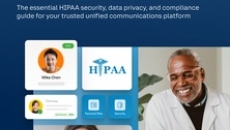Compliance & Legal
Healthcare organizations are looking for the proper use of OpenAI, research on LLMs and bias in AI technology. Harjinder Sandhu, CTO of health platforms and solutions at Microsoft, has the answers.
Also: Akamai releases a new tool that monitors website visitor behavior and helps detect malicious scraper bots looking to steal data.
Novii+ allows for continuous monitoring of high-risk pregnancies after 34 weeks, and alerts care teams of heart rate and contraction patterns during labor.
Ram Rimal and Mike Plesh from UNC Health preview their HIMSS24 panel session, where they'll review how multiple stakeholders across UNC created a framework for adopting both vendor and in-house artificial intelligence applications.
The sector has strengths in cybersecurity and communications but lacks innovation, the Aged Care Industry Information Technology Council notes.
SPONSORED
With a majority of healthcare organizations lacking proper technology to address HIPAA compliance, it’s imperative that quick action is taken to avoid serious security and data privacy breaches. Our comprehensive guide provides you with all you need to know to address this time-sensitive issue.
Further guidance is needed to protect patients from "sycophantic" genAI documentation outputs that influence medical decisions, and researchers are asking the FDA "to clarify its oversight before summarization becomes a part of routine patient care."
Amazon Web Services has concerns around AI use in healthcare and regulating the technology. But it can show the benefits of AI/ML in helping life sciences firms with drug development. Dr. Jared Saul, chief medical officer at AWS, discusses the issues.
The Sunshine State's proposed law would shield governments and businesses against liability claims that result from a data breach that occurs during a cyberattack.
In a short time online, organizations can capture more patient concerns, reduce more open cases and improve staff experiences, say Alpa Vyas of Stanford Healthcare and Dr. Adrienne Boissy of Qualtrics and the Cleveland Clinic.









